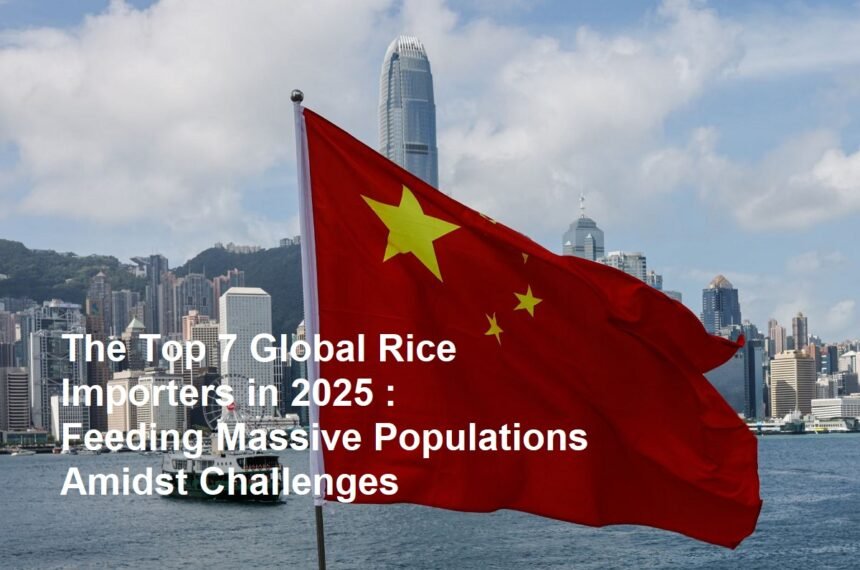Introduction
Rice, the staple food for over half the world’s population, fuels nations and drives a massive global trade. As we move through 2025, the landscape of rice importers remains dominated by a group of countries facing significant challenges: soaring populations, limited arable land, water scarcity, climate impacts, and sometimes policy constraints. Based on consistent projections from the USDA, FAO, and major agricultural analysts, China, Nigeria, the Philippines, Iran, Saudi Arabia, Indonesia, and Iraq stand as the world’s seven largest rice importers this year. Here’s a closer look at each:
1. China: The Giant with Shifting Needs
- Volume:Consistently tops the list, importing millions of tonnes annually (projections often exceed 5-6 million tonnes for 2025).
- Why?Despite being the world’s largest producer, China’s massive population (over 1.4 billion) creates immense demand. Key drivers include:
- Dietary Shifts:Rising middle-class demand for higher-quality, aromatic, and specialty rice varieties not abundantly grown domestically (like Thai Hom Mali or Basmati).
- Price & Reserve Strategy:Imports supplement domestic supply, help stabilize prices, and contribute to building strategic reserves.
- Land & Water Pressures:Urbanization and environmental constraints limit domestic production expansion.
2. Nigeria: Africa’s Leading Consumer
- Volume:Regularly imports over 2 million tonnes, often ranking 2nd globally.
- Why?Boasting Africa’s largest population (over 220 million), Nigeria faces a critical gap:
- Production Deficit:Domestic production, while significant, cannot keep pace with rapid population growth and urbanization.
- Logistics & Infrastructure:Challenges in storage, transportation, and processing lead to post-harvest losses.
- Affordability & Preference:Imported rice (often broken or lower-grade) remains a crucial affordable staple, especially in urban centers.
3. Philippines: Vulnerability and Security
- Volume:Typically imports between 3-4 million tonnes annually.
- Why?Rice is central to Filipino diets and politics:
- Typhoon Vulnerability:Frequent devastating typhoons destroy crops, forcing large-scale imports to ensure food security.
- Population Pressure:A large, growing population concentrated on limited arable land.
- Government Policy:The National Food Authority (NFA) actively manages imports to stabilize prices and maintain buffer stocks, often leading to significant volumes even in decent harvest years.
4. Iran: Sanctions, Scarcity, and Sustenance
- Volume:Imports consistently hover around 1.5 – 2+ million tonnes.
- Why?A combination of environmental and geopolitical factors:
- Chronic Water Scarcity:Severe droughts and water mismanagement drastically limit domestic rice production capacity.
- High Domestic Consumption:Rice is a major staple, particularly prized varieties like premium Basmati.
- Economic Pressures:Sanctions and economic instability can impact import capacity and sourcing, but the fundamental demand remains high.
5. Saudi Arabia: Desert Dependency
- Volume:Imports over 1.5 million tonnes annually.
- Why?Extreme aridity defines its agricultural limitations:
- Water Conservation Policy:A strategic decision to phase out water-intensive domestic wheat and rice farming to preserve scarce groundwater resources. Virtually all rice consumed is imported.
- Population & Expatriates:A large population, including millions of expatriate workers from rice-consuming cultures, drives consistent high demand.
6. Indonesia: The Self-Sufficiency Balancing Act
- Volume:Imports fluctuate significantly (often 1-3+ million tonnes) based on harvests and policy.
- Why?Strives for self-sufficiency but faces hurdles:
- Climate & Disasters:Droughts, floods, and pests frequently disrupt domestic production.
- Population Scale:Feeding over 275 million people requires massive quantities.
- Buffer Stocks & Price Control:The government agency BULOG imports to maintain price stability and national reserves, especially after poor harvests or during price spikes. Policy shifts heavily influence annual import volumes.
7. Iraq: Rebuilding and Reliance
- Volume:Consistently imports over 1 million tonnes.
- Why?Decades of conflict and environmental stress have crippled agriculture:
- Water Scarcity & Upstream Dams:Reduced flow from the Tigris and Euphrates rivers (due to dams in Turkey and Iran) severely impacts irrigation for rice paddies.
- Infrastructure Damage:War and instability have damaged irrigation systems and farming capacity.
- Subsidized Staple:Rice is a key part of the government-subsidized food basket provided to citizens, necessitating large imports to meet this commitment.
Common Threads and Global Implications
- Population Growth:All seven nations have large and often rapidly growing populations, underpinning massive baseline demand.
- Resource Constraints:Water scarcity (Iran, Saudi, Iraq), limited arable land (Philippines, Indonesia), and vulnerability to climate change (Philippines, Indonesia) are critical limiting factors for domestic production.
- Food Security Imperative:Imports are essential for national food security and political stability, particularly for countries like the Philippines, Nigeria, and Iraq.
- Market Sensitivity:These top importers significantly influence global rice prices. Any surge in demand from one, or a production shortfall in a major exporter (like India, Thailand, Vietnam), can cause significant price volatility.
- Logistics & Geopolitics:Efficient shipping routes, port capacity, and international relations play a vital role in ensuring these nations receive the rice their populations need.
Conclusion:
The list of top rice importers in 2025 reflects a complex interplay of demography, geography, climate, policy, and economics. China, Nigeria, the Philippines, Iran, Saudi Arabia, Indonesia, and Iraq each navigate unique challenges, but their collective reliance on the global rice market underscores the grain’s critical role in feeding the world. As climate pressures intensify and populations grow, the strategies these nations employ – from reserve management to water conservation and trade diplomacy – will be crucial not only for their own stability but also for the health of the global food system. Their demand ensures that rice remains one of the world’s most strategically important agricultural commodities.












